Past
Since Mary Gillham was born in 1921 it’s safe to say the conservation sector has changed in many ways, thanks to women like Mary.
Since Mary Gillham was born in 1921 it’s safe to say the conservation sector has changed in many ways, thanks to women like Mary.
Dr Mary E Gillham (1921 – 2013) was a committed conservationist who spent over 50 years working to protect wildlife in Wales.
During her university studies, Mary first visited Skomer and Skokholm, which inspired her love of islands. She spent the following decade researching the effects of substrate, environmental conditions, grazing and birds on the differences in vegetation between the two islands for her PhD.
With a desire to share her knowledge Mary went onto become a lecturer of botany, ecology and ornithology. She taught in England, New Zealand and Australia, before returning to South Wales to work at Cardiff University. She immediately joined the Cardiff Naturalists’ Society and Glamorgan County Naturalists’ Trust, which was an early manifestation of The Wildlife Trust of South and West Wales.
As the industrial landscape of South Wales changed, Mary was interested in how the land could be transformed to benefit both people and wildlife. She contributed to the creation of several protected areas, many of which are still under our protection today, including our Coed y Bedw, Lavernock Point, Llyn Fach, Coed y Bwl, Taf Fechan and Pwll Waun Cynon nature reserves.
Over her career, Mary paved the way for women to take a more active role in wildlife conservation and research. She was one the first female scientists to join an Antarctic Research Expedition, which inspired and empower other women to do the same.
Over her lifetime Mary authored over 20 books and 50 scientific papers, taught thousands of students, photographed people and wildlife from all over the world, and raised the profile of important environmental issues. She was awarded an MBE for services to nature conservation in 2009.
You can find out more about her incredible life and legacy thanks to the Mary Gillham Archive Project.
At The Wildlife Trust of South and West Wales, we’re lucky to be made up of a team of passionate researchers, conservationists, and science communicators. We asked our team to share their journey into conservation, what their role involves and their advice to women and girls aspiring to work in this field.
"I am a PhD student at the University of Bristol. I am working with the team at WTSWW to monitor the Bottlenose dolphin population in Cardigan Bay using acoustic monitoring aka eavesdropping on dolphins!
My current research focusses on factors influencing Bottlenose dolphin whistle communication (such as noise and habitat structure) and the use of acoustic monitoring as a conservation tool. Each Bottlenose dolphin produces a unique identity whistle, called a signature whistle, which it uses like a name to broadcast its whereabouts. Our research in Cardigan Bay aims to record these whistles and use them to estimate population size and the movements of individual dolphins. I love using acoustic methods as the deployments at sea and the huge volumes of data provide lots of challenges to overcome, and there is so much rapid innovation in analytical methods in this field!
I completed a Masters in Marine Mammal Science at the University of St Andrews and then spent several years working as a research assistant studying the movements of Harbour porpoises around tidal turbines using acoustic monitoring. This role showed me the valuable insights we can obtain through eavesdropping on marine mammals, and how we can apply this to conservation. For me, a PhD felt like the natural progression and I’ve loved getting to develop my independence whilst working alongside really inspirational and supportive colleagues.
My favourite part about my role without a doubt, is the fieldwork! I feel so privileged to have the opportunity to closely observe dolphins in the wild, and spending time with them in the field is my major source of motivation.
My advice would be to always persevere and be resilient. There will inevitably be setbacks because this is a really competitive field, but don’t take the setbacks personally as they are not a reflection of your ability. Focus on developing your skills; there are lots of free resources online for free software programs like R and QGIS which will be attractive to prospective employers in most lines of research/conservation. Keep an open mind – take opportunities even if they are not in the exact area you are most interested in, as there is a lot of value in gaining broader perspectives."
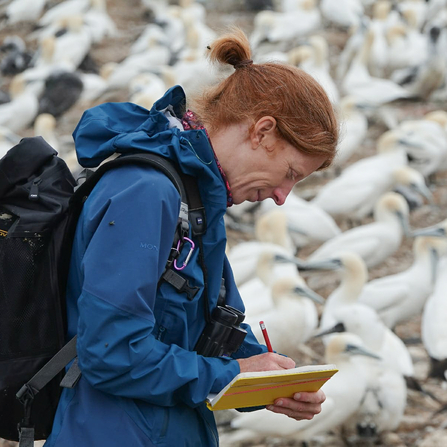
"I’m the Head of Islands and Marine Conservation for WTSWW (or as I was nicknamed in my first week ‘Head of Rocks and Watery things!’). I oversee the conservation teams on Skomer and Skokholm Islands and at the Cardigan Bay Marine Wildlife Centre and am part of the senior management team of the Trust. My role is incredibly varied and I won’t deny it can be a challenge. Working on projects in the marine environment, often involving boats, wind and swell and where information can be lacking is never an exact science. My work involves securing grant funding to support our long-term seabird and cetacean monitoring and research projects and championing their importance. As a team we have excellent links with universities and experts in marine biology and ornithology and I work hard to facilitate study based on and around our marine special protected areas and nature reserves. I respond to consultations on the latest offshore renewable developments and am part of the ongoing response to Avian Influenza. I work with local stakeholders and volunteer groups on everything from marine codes and wildlife disturbance to providing opportunities for all to access, enjoy and ultimately protect the marine environment.
Birds are my main interest, seabirds in particular, although I have to confess that my favourite bird will always be the Nuthatch. They are certainly not a regular on our windswept and treeless coast and islands whereas the seabirds are utterly spectacular! When I moved to Pembrokeshire over 25 years ago, I soon got hooked on the marine environment and especially Grey Seals and I was privileged to study the population on Ramsey Island for nearly 15 years.
I studied biological sciences at university, but I’m not an academic and I was always happiest when out on a fieldtrip, getting dirty in my wellies. My career in conservation started with my time as a volunteer for various charities, but most influential were my summer holiday’s spent volunteering on Skomer and Skokholm. When I finished university, I got a job in an office each winter to pay the bills and subsidise my long summers volunteering and initial short term contracts in seabird monitoring and assistant warden roles on the islands. It wasn’t long before I gave up the ‘sensible, well paid’ office job to give conservation a go full time and was lucky enough to work for both WTSWW and RSPB Cymru in island warden roles for the nearly 20 years.
My favourite part of your job has to be the people I work with. I know how incredibly hard they all work, but also how much they care about the sites and species they protect and monitor every day. They are all genuinely nice people and that makes my support role all the more worthwhile. I have massive respect for their knowledge and expertise and ability to adapt and turn a hand to just about anything. I’m proud of everything they achieve and their team spirit.
My advice would be don’t be too shy to ask, you really won’t be bothering anyone. My experience of people involved in the charity sector and conservation is that they are friendly, generous and want to share. Whether you want to learn about the breeding biology of Manx shearwaters or the social interactions of Bottlenose Dolphins or need to know how to drive a tractor or repair a roof after a storm, they will help if you are interested. I’d also encourage people to acknowledge their achievements (women are terrible at selling themselves), don’t be too hard on yourself and give yourself a break occasionally."
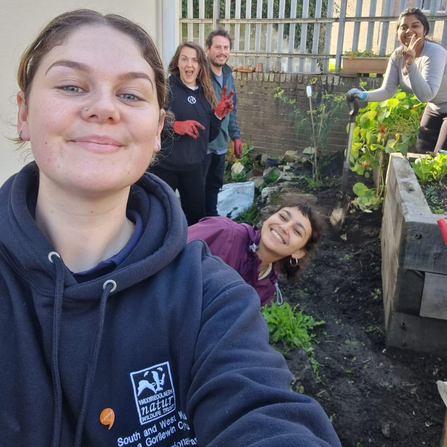
"In my role I work with different communities around Swansea to take action for nature, empowering them to look after their local patch and create new space for wildlife to thrive.
I’m passionate about bringing people and nature together. Our society is disconnected from the natural world and the organisms that live in it. Nature can help our wellbeing, provide climate resilience, and bring us joy. As well as this I have a bit of a fascination with moths!
I studied Biology at University because I loved how varied the topic was. Throughout my studies I became more interested in conversations around climate change and the impact humans have on our natural world. This led me to conservation and my job with the Wildlife Trust of South and West Wales.
My favourite part of my role is how often I get to be outside. Being outside bring me so much joy and energy and being able to experience that with other makes me happy.
My advice would be to get out there and don’t be afraid you don’t know it all. You are valuable and have so much to bring to the world of conservation. This sector is dynamic and vast and it’s always a learning curve so keep going."
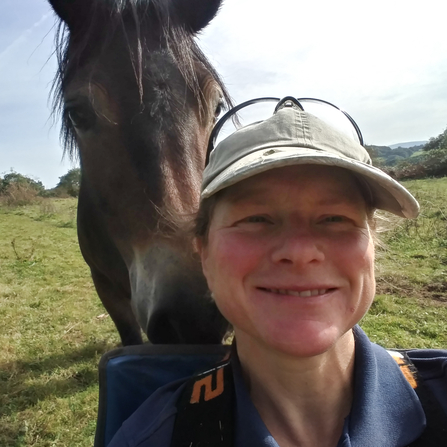
"I’m a Wildlife Trust Officer, mostly working on nature reserves in Brecknock.
One of my areas of interest is botan. I really like seeing a good group of wildflowers. One of my first projects was to persuade my dad not to mow the Cuckoo flower in the little orchard area in our new house. It was great seeing the numbers of plants increase each year. At school I joined the local Wildlife Trust and helped on nature reserves local to us. I took on the great responsibility of being volunteer warden of a peaty pond with floating Sphagnum moss. Assisted by my dad who drove me there until I could drive, we picked litter and pulled seedling trees out of the mossy edges.
I did Zoology at university and joined the CREW (Clydesdale Regional Environment Volunteers), a good opportunity to get out of the city. I remember there was a practical traineeship, but I was put off applying because I didn’t think I would be strong enough to do the chain sawing and practical work. I spent a few years doing volunteer placements all over the UK to gain valuable skills and experience but struggled to get that first proper job. I spent some time with Somerset Environment Records Centre where I learnt to identify a range of grass species. This botanical knowledge helped me get a job as a Local Wildlife Site Officer for Brecknock Wildlife Trust. As it was a small Trust I helped out with various aspects of their work. Eventually I was asked to help run nature reserve work parties, just a few to start with, then given the responsibility of a couple of reserves and it went from there.
My advice is specific to women in the more male dominated roles in conservation like rangers or reserves officer. Women don’t always consider these roles when looking at the jobs available. I think you have to ask yourself are you discounting these roles and are you putting up your own barriers? I think I did. It’s worth finding out more and giving it a go. If you are starting out, you have plenty of time to try different jobs. Regarding physicality, practice your technique, use levers or ask people nicely to help, look after yourself, never mind what others think."
"I’m fascinated by seabird ecology, and feel strongly about the importance of generating long-term data sets to monitor their populations and influence conservation strategy. I’m also committed to creating better opportunities for everyone to engage with the natural world and to working collaboratively to help tackle the barriers to inclusion and diversity in the conservation sector.
I had a meandering route into conservation – after studying philosophy and English literature at university, working in journalism, then working and campaigning in the women’s sector, I upped sticks and started volunteering on nature reserves. I completed an apprenticeship at Lindisfarne National Nature Reserve in Northumberland and haven’t been far from salt water since.
I love the variety of my role. It’s a great mixture of ecological monitoring and people engagement, with a fantastic team of staff and volunteers. And of course, it’s not a bad office... there’s not much to beat falling asleep to the sound of shearwaters, or watching young guillemots tumbling from the cliffs to begin their life at sea.
For anyone trying to build a career in conservation, I would say that whilst it can be a hard old slog at times, there will be some incredible moments, generous teachers, and steadfast friends, which – for me – have made this funny old lifestyle worthwhile. Also, remember that even when you love your job, it’s still a job – so make room for the other bits in life too. Pob lwc!"
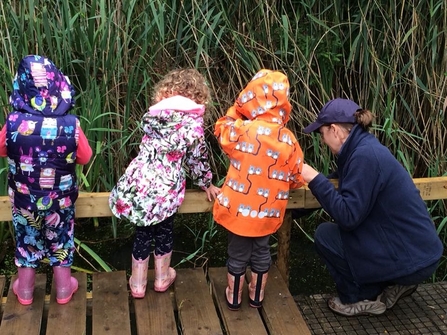
"I am a qualified primary school teacher with a degree in Psychology. I work part time at Teifi Marshes as a People & Wildlife Officer. This involves providing curriculum linked activities for school visits, holiday activities for visitors and guided walks/talks for all ages. All of my working life, I have worked with children and young people in various roles including providing educational, entertaining and engaging activities.
Although I always had a love for and an interest in nature, it wasn’t until my thirties that I became involved with a local conservation group and started volunteering. I learned about habitat management, created ponds and developed heritage skills such as dry stone walling and hedge laying.
The best part of my job is stoking the fires of interest and enthusiasm in others; there is nothing better than seeing a child (or adult) really engage with nature and what they’re learning. I hope that some of the people that I’ve influenced go on to develop a lifelong love for nature or even decide to pursue a career in the industry.
If you wish to work in the conservation sector, I would say follow your passion. Volunteer with a group if you can to get experience and knowledge. Also develop your own skills and knowledge by learning more about species or habitats that you are interested in. I know so much about invertebrates and insects now that I didn’t know when I started this role but I’ve taught myself and learned from others. And never think it’s too late; if you’re passionate about something, you’ll have the motivation to learn & progress. Go for it!"
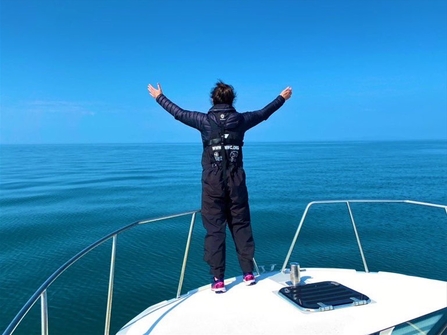
"I am a marine scientist and have been involved with Cardigan Bay Marine Wildlife Centre (CBMWC) since 2003 when I first came to New Quay as a volunteer! I now head up the marine team based at the. I am responsible for managing the centre, the CBMWC marine conservation team and our scientific research.
I originally studied Zoology at the University of Liverpool and I also have a PhD on developing predictive habitat models of megafauna distribution from Aberystwyth University.
My main area of interest is undeniably the sea and marine conservation. I am passionate about safeguarding the marine environment now and for the future. If I was to pick a species I am passionate about it would have to be bottlenose dolphins, they are one of the species we conduct research on and the Cardigan Bay bottlenose dolphins have been part of my life for 20 years!
As part of my job I spend time on the sea conducting boat surveys which involves gathering valuable data and information on marine species in Cardigan Bay. This includes capturing photo-identification images of bottlenose dolphins and collecting dolphin vocalisations as part of our acoustics research.
My advice to women and girls trying to pursue a career in conservation is to go for it! Follow your passion. Of course, hard work and determination gets you far. Never give up and remember no matter what it appears like on the face of things, we are all facing our own battles – be kind. I used my free time to learn new skills and dedicated myself to what I was interested in. If you are able to volunteer then I would recommend doing so as volunteering is a great way to network, to gain experience and meet new people."
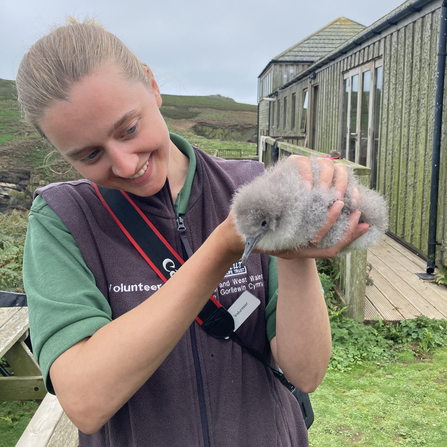
"I am the Trust's Fundraising and Communications Officer, which means my job is wonderfully varied. I coordinate campaigns, manage our social media and website, produce videos, write blogs and press releases, and support our dedicated fundraisers. My role is all about sharing the amazing conservation work the Trust is doing and inspiring people to act for Welsh wildlife.
I am interested in everything! From butterflies to bottlenose dolphins, everything in the natural world fascinates me. I studied Conservation Biology at University of Exeter in Cornwall, which ignited my love for all things marine. It also instilled the importance and my passion for connecting people with wildlife and inspiring them to act for the natural world. I’ve always loved using my camera to capture the beauty of the world around me and after graduating I combined this with my science background to make a range of short films for environmental charities.
There are so many things I love about my job. I really enjoy all the opportunities I have to be creative, work collaboratively with a team of inspiring people and get out to explore the incredible wild places we have in South Wales.
Trying to secure a job within the conservation sector can be challenging. My advice would be to not be afraid of putting yourself out there and creating your own opportunities. Taking on your own projects can help you learn new skills and find out what you enjoy, which better prepares you for when the right opportunity comes along."
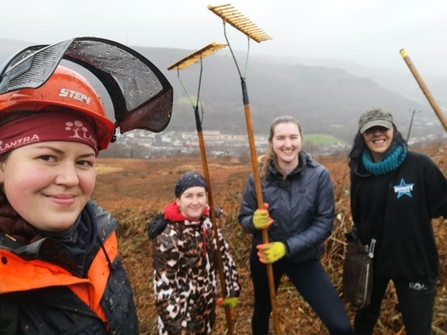
"I started my childhood by crossing roads as a toddler to see animals, this progressed to animal management at college, wildlife conservation at university, lots of volunteering and a placement with the Derbyshire Wildlife Trust. After a few jobs in the wider industry, I found my calling with the Wildlife Trust of South and West Wales.
My favourite part of my job is connecting to nature and helping to protect what I am passionate about. A close second is helping people to connect with nature in their way and see the passion ignite in them and sharing that joy.
My advice to anyone wanting to work in conservation is to persevere in following your dreams. If you do not know exactly which aspect you are most interested in, get experience in as many different areas as possible, volunteering or through your career. If you do what you love, life makes much more sense!"
We are passionate about educating and empowering the next generation of conservationists. We’re fortunate to work with many young women and girls through our education sessions and youth forums. We asked some of them why they are passionate about protecting the natural world and what career they hope to pursue in the future.
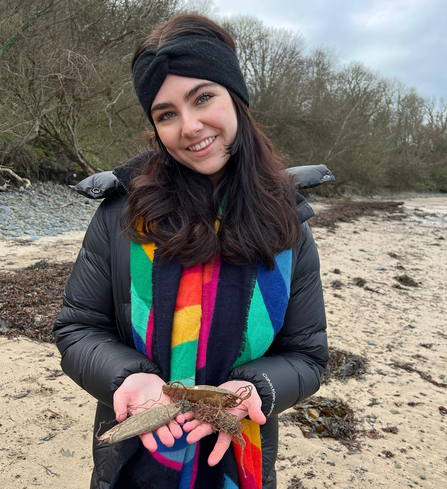
"I have been a proud volunteer for the Trust for several years and enjoy attending events, activities, assisting with monitoring, and liaising with members of the public to inspire them about our natural world and promote the Trusts’ conservation work and important research.
I have a passion for protecting our marine environment and have a soft spot for cetaceans and seabirds. I feel very lucky to live in Wales and be able to watch Dolphins from Cardigan Bay harbour wall and photograph Puffins on Skomer Island. I’m extremely passionate about protecting our marine environment and organising beach cleans within my local area. Our Welsh seas are as diverse as they are dynamic. They are home to an incredible array of habitats and marine life which never fails to inspire me to want to protect it.
As a volunteer and keen wildlife photographer, I've witnessed first hand the beauty of our natural world and the urgent need to preserve it. I'm also proud to be a 2024 Miss Earth Wales Finalist, and passionate about promoting our amazing Welsh wildlife and the importance of protecting it on a national and international platform. I think that I’ve always known that my dream job would be to work towards channelling this passion into positive action to protect our natural world by specialising in environmental legislation. My dream job would be a fusion of passion and purpose, where my legal expertise meets my love for the natural world, and together, hopefully I can make a difference that reverberates far beyond the courtroom."
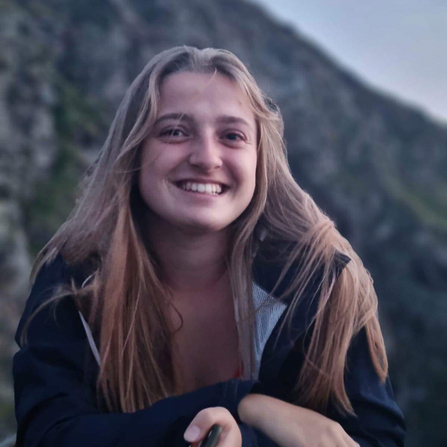
"I am a member of Stand For Nature group in Cardiff. As a lifetime wildlife wanderer, ensuring the great outdoors and all those that live in it are safe and secure for years to come is really important to me. My dream job is to be a warden or ranger, to take the care of an area, be it an island, a woods, or a field! Putting all the content from my Biology masters into practice!"
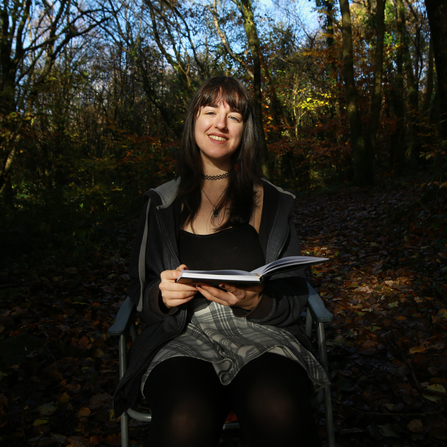
"I am a part of the Stand for Nature group. I volunteer my time to support campaigns, be in media, plant trees and meet other people who love nature. Nature's not only beautiful, but it has always been here. We are part of nature and we won't survive without it! My dream job would be to be in the psychology side of wildlife conservation - empowering and leading people to do action and make change. Be sure that I'm already making the right steps and gaining experience that'll lead me there!"
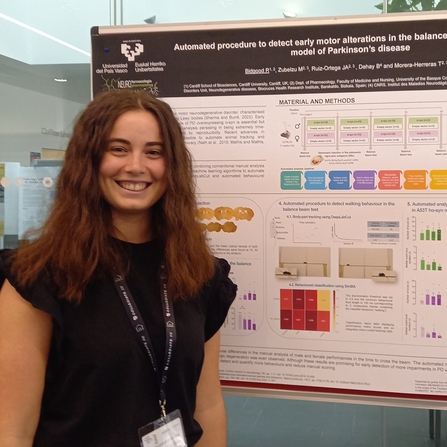
"I'm volunteering with Stand for Nature in Cardiff. I believe that now more than ever, we have to act in order to see change in political priorities and put the environment and conservation work in the forefront. I'm currently in my final year of my BSc in Neuroscience with Professional Training Year, and am hoping to pursue a career in neuroscience research."